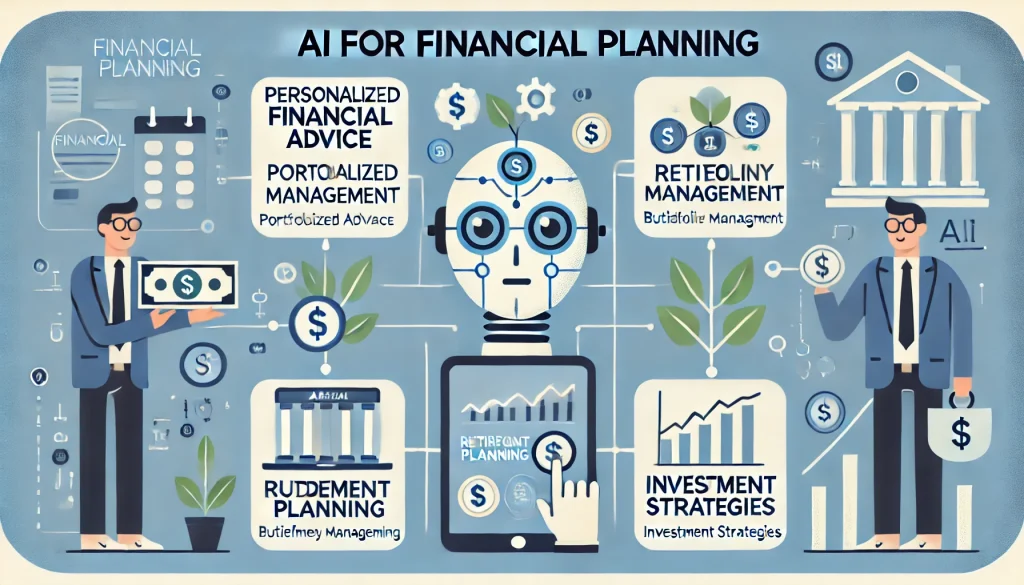Table of Contents
- 1 Key Takeaways
- 2 Table of Contents
- 3
- 4 AI and the Evolution of Financial Decision-Making
- 5
- 6 Personalization: A New Standard in Client Experience
- 7
- 8 Automation in Portfolio Management
- 9
- 10 Data Privacy and Ethical AI Use in Finance
- 11
- 12 The Role of Predictive Analytics in Risk Assessment
- 13
- 14 Real-Life Examples: AI Transforming Financial Planning
- 15
- 16 Staying Current in a Fast-Changing Environment
- 17
- 18 Looking Ahead: The Future of AI in Financial Planning
Key Takeaways
- Artificial intelligence is dramatically reshaping financial decision-making, making data-driven strategies more effective, precise, and accessible than ever before.
- Personalization and automation, enabled by AI-powered platforms, are quickly becoming integral to client experiences across the financial landscape.
- Upholding data privacy and ethical AI use is crucial as more sensitive financial information moves into cloud-based, intelligent systems.
- As technology rapidly evolves, education, adaptation, and transparency are essential for professionals and consumers.
- Embracing the partnership between human expertise and machine-driven insights can lead to greater financial empowerment.

Table of Contents
- AI and the Evolution of Financial Decision-Making
- Personalization: A New Standard in Client Experience
- Automation in Portfolio Management
- Data Privacy and Ethical AI Use in Finance
- The Role of Predictive Analytics in Risk Assessment
- Real-Life Examples: AI Transforming Financial Planning
- Staying Current in a Fast-Changing Environment
- Looking Ahead: The Future of AI in Financial Planning
AI and the Evolution of Financial Decision-Making
Over the last decade, artificial intelligence has moved from a futuristic concept to a key player in financial planning. Today, advanced algorithms and machine learning tools are deciphering complex financial data at an unprecedented scale. Financial planners and businesses daily contend with enormous datasets from market movements, client portfolios, and global economic signals. AI has made it possible to process this torrent of information in seconds, delivering insights and actions that once demanded hours or even days of manual effort. For example, platforms specializing in AI retail site selection demonstrate how algorithmic analysis can identify market trends, assess risk, and suggest optimal strategies in real time. These technologies are now being repurposed and expanded to help individuals assess investment opportunities, understand cash flow, and improve overall financial health. This is so powerful because it reduces the gap between institutional and individual access to data-driven decision-making, putting sophisticated financial intelligence in more hands than ever before.
As digital transformation accelerates, financial institutions and advisors increasingly leverage AI across various functions—from customer onboarding to asset management. This growing adoption drives streamlined workflows that reduce operating costs, enhance accuracy, and create new opportunities to deliver more personalized client experiences. Automated tools significantly minimize data entry errors that once burdened financial professionals, freeing up valuable time for strategic planning, market analysis, and tailored advisory services. Rather than replacing human expertise, AI serves to amplify it, empowering professionals to make faster, more informed decisions that align with the evolving demands of the modern financial landscape.
Personalization: A New Standard in Client Experience
AI has ushered in an era of hyper-personalization in financial planning where advice and recommendations feel nearly bespoke. No two clients are the same, and intelligent systems now tailor solutions by analyzing complete financial pictures—from monthly cash flow and savings habits to employment trends and family needs. Imagine a scenario where a young professional is juggling student loan repayment, saving for a first home, and investing for retirement. An AI-powered planner can analyze spending, detect changes in income, recognize milestones, and proactively suggest adjustments to keep all goals on track. The machine’s ability to run complex simulations and predict various scenarios enables smarter, more flexible, fine-tuned strategies as each individual’s circumstances evolve.
This level of customization frees financial advisors from time-consuming administrative tasks such as transaction categorization, risk flagging, or manual budget review. Instead, they can concentrate on strategic planning and deepening client relationships. Clients, meanwhile, benefit from predictive nudges that help them avoid pitfalls, capitalize on savings opportunities, and anticipate upcoming expenses. As AI systems gather more data over time, their advice grows even more relevant and precise, making personalization not a luxury but a daily expectation in modern financial services.
Automation in Portfolio Management
Automated investment platforms have brought about a seismic shift in portfolio management. AI-driven systems don’t just periodically rebalance assets; they continuously monitor market activity, client preferences, and external variables to optimize portfolios dynamically. Whether for novice investors just starting with small contributions or high-net-worth individuals with complex holdings, automation offers a hands-off yet highly sophisticated approach to wealth management.
These intelligent tools execute tax-loss harvesting, maximize risk-adjusted returns, and provide detailed performance analytics, often for a fraction of traditional advisory fees. Automation can handle thousands of transactions with accuracy and timeliness unattainable by manual methods. Furthermore, easy-to-use dashboards and real-time alerts empower users to make informed decisions and adjustments without becoming market minutiae experts. This democratizes investing, letting anyone take advantage of sophisticated strategies previously available only to institutional clients.
Data Privacy and Ethical AI Use in Finance
As these technologies become more prevalent, concerns over data privacy and ethical use are rising. Financial data is a consumer’s most sensitive information, and breaches or misuse can have serious repercussions. The increasing reliance on cloud-based platforms and centralized data lakes heightens these risks and compels organizations to prioritize robust governance and security at every step. Clients want to know that their personal financial data is protected and that AI-driven decisions are fair, unbiased, and explainable.
Leading organizations follow guidelines and best practices to foster trust and ensure compliance. This includes being transparent about what data is collected, how it is used, and how often it is reviewed for consistency and bias. Businesses taking proactive steps—such as performing regular algorithm audits, engaging third-party oversight, and offering users control over their data—are better positioned for long-term credibility. As the financial sector becomes more reliant on automated decision-making, ethical AI and client transparency are no longer optional but essential operating principles.
The Role of Predictive Analytics in Risk Assessment
The advent of predictive analytics represents a quantum leap in evaluating and managing financial risk. Instead of reacting to market downturns or bad loans after the fact, AI empowers banks, lenders, and financial advisors to forecast challenges and opportunities in advance. By analyzing huge ranges of data—transaction records, payment histories, geolocation, and current economic trends—predictive algorithms can assign probability scores to future events. This helps organizations and individuals make more timely, informed, and proactive decisions.
For example, lenders deploy AI to expand credit access by analyzing alternative data sources, resulting in fairer, more inclusive scoring models. Meanwhile, fraud detection systems use anomaly detection to flag suspicious transactions within milliseconds, minimizing loss while sparing clients the stress and disruption of delayed actions. Even small business owners and everyday consumers now benefit from predictive models highlighting cash-flow gaps before they become emergencies. The shift from reactive to proactive financial management is helping everyone—from mega-institutions to solo entrepreneurs—navigate uncertainty with greater confidence.
Real-Life Examples: AI Transforming Financial Planning
- AI-powered budgeting apps transform raw financial data into daily insights, categorizing expenses, sending real-time notifications, and suggesting actionable steps for more innovative money management. Instead of waiting for end-of-month statements, users continually track progress toward savings or debt reduction goals.
- Forward-thinking lenders go beyond traditional credit scoring by integrating recurring payment patterns, rental histories, and alternative data into their models. This approach brings fair lending opportunities to historically underserved borrowers who might otherwise be overlooked.
- Robo-advisors deploy 24/7 portfolio oversight, reallocating assets and adjusting risk profiles automatically in response to market swings and individual life events. This delivers peace of mind and improved investment outcomes regardless of market complexities or time zones.
Staying Current in a Fast-Changing Environment
Today’s financial landscape means being perpetually curious and aware of emerging tools and evolving regulations. From certified financial planners to independent investment coaches, financial professionals prioritize continuing education, subscribing to industry digests, and networking with their peers to remain informed about the latest best practices and compliance standards. This approach doesn’t merely serve compliance needs—it enables deeper client trust and more holistic, customized financial guidance.
Individuals, too, are increasingly taking charge of their financial literacy. By leveraging educational content, workshops, and online communities, clients build the confidence to ask the right questions and make independent, empowered decisions. The more people understand AI-driven tools and processes, the better equipped they become to benefit from technology and spot potential limitations or oversights.
Looking Ahead: The Future of AI in Financial Planning
The continued advance of intelligent systems in the financial world signals a future where collaboration between humans and AI yields the greatest value. While AI will continue to bring precision, speed, and objectivity, the wisdom, empathy, and moral judgment of human advisors remain irreplaceable. Together, these forces are set to define a new era of clarity, trust, and opportunity.
Ultimately, the winning strategy will blend technical prowess with ongoing professional development, transparency, and ethical conduct. As technology and regulations evolve, organizations and individuals proactively seeking knowledge and prioritizing responsibility will cultivate enduring relationships and financial success. For everyone striving toward their financial goals, these innovations make the future manageable, brighter, and more accessible than ever.



